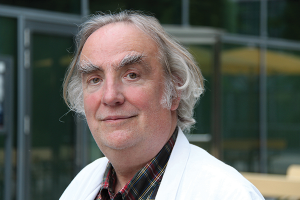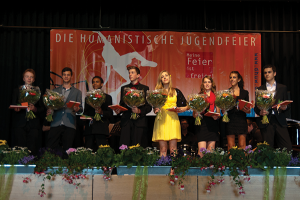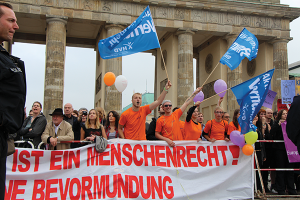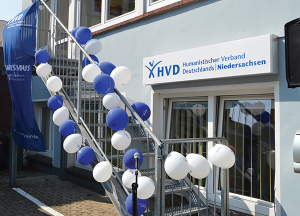The Power of Humanist Organizing in Germany: An Interview with Frieder Otto Wolf
 Frieder Otto Wolf (Photo by A. Platzek)
Frieder Otto Wolf (Photo by A. Platzek) DR. FRIEDER OTTO WOLF is the president of Humanistischer Verband Deutschlands (HVD), the national association of German humanists. He is also honorary professor in philosophy at the Free University of Berlin and the founding president of the Humanistische Akademie Deutschlands (a humanist think tank). He was a member of the European Parliament for Die Gruenen (The Greens) from 1984 to1999 and founding chair of the Koordinierungsrat saekulaerer Organisationen (a coalition of German secular organizations) from 2008 to 2012. Dr. Wolf may be contacted at fow@snafu.de.
Charles Murn: Describe the strength and breadth of the humanist movement in Germany.
Frieder Otto Wolf: It’s useful first to unravel the catchphrase “humanist movement.” I distinguish humanist attitudes in the population from spontaneous humanitarian and humanist initiatives, and from humanist organizations. As a modest estimate, probably about 30 million of the 80 million German people share a clearly nonreligious attitude. Even among declared Christian, Muslim, or Jewish believers a significant percentage share a humanist attitude that is not based on faith in “higher powers.” More narrowly, specific elements of modern humanism—from the respect for human dignity via the need to fully implement human rights, to the demand of a clear disentanglement of church and state—have overwhelming support in the German population.
As for those 30 million I mentioned, humanism can’t claim them all. I would distinguish at least three major groups: (1) the indifferent—i.e., those who don’t care, or who are unable or unwilling to think about their life-stance or to articulate anything like a worldview, and who certainly do constitute majorities within the Protestant and Catholic churches; (2) the occasional or uncommitted practitioners, who simply share and participate to some degree in the defining practices of a lifestance; and (3) the intellectually and culturally active participants who are interested in understanding the meaning of those practices and actively contribute to their continuation and eventual reshaping. The number of indifferent is difficult to estimate, but is certainly more than a third of the 30 million, and therefore at least 10 million, probably more. We have reasons to think that the second group is certainly larger, ranging from 15 to 18 million. Thus, if we may estimate the number of Germans with-out any religious affiliation who fall in this final “active” category, they number some 2 million. These rough estimates are corroborated by opinion polls.
Murn: Does the strength of the German humanist movement reflect that proportion of the population?
Wolf: The visibility and weight of these humanists in the German population has been and still is strongly reduced by two historical factors. On the one hand, the churches—starting with the rite of baptism—include infants in their organizing, while non-church groups tend to be looked for among the adult population. On the other hand, the pre-World War II precursors of today’s humanist organizations, the freethinking organizations, were mass organizations. But these mass organizations were crushed by the Nazi regime.
In former West Germany (the “West”), turning to the churches seemed to be a way for people to escape the Nazi past. The Social Democratic Party concentrated their efforts on broadening their social bases, so that separately reorganizing the freethinking organizations was unpopular. In former East Germany (the “East”), with a quarter of the overall population of united Germany, elements of these traditions were taken over by the state. Autonomous organizing was discontinued. In the 1960s growing individualization made it more unattractive to join a mass organization in the West. As a result, some regional or local humanist or freethinking communities dwindled almost to insignificance. This largely explains the situation of today, when organized humanism is only managing to reach its larger public in certain places, like Berlin and Nuremberg. In all other German regions and cities, organized humanism operates on the level of groups of personal friends, if it exists at all.
Murn: I’ve read of the opening of new humanist centers in Germany. How many humanist centers are there and how are they financed?
Wolf: This is just one example of our strategy to make ourselves useful to people by our practical offers. By concentrating our administration and public meeting space in one center (usually converted houses), we make it clearly visible that they are held together by an underlying humanist orientation. Such centers of practical humanism exist in all our regional and local organizations old enough to have acquired the needed finance to build, buy, or rent their building. In contrast, young branches of our organization make use of public facilities offered to associations by municipalities. Occasionally, we still make use of the German tradition of meeting in pubs that offer rooms for that purpose.
In areas where our organization has more members, like in Berlin, we prefer to decentralize in order to get closer to the people. But of course, our staff is large enough to give rise to a real center, too.

Youth ceremony in Stuttgart, Baden-Württemberg in 2013
Murn: Tell me about the efforts to establish humanist customs, traditions, observances, affirmations, and other cultural formalities, including recognition of humanist holidays, in Germany.
Wolf: A number of humanist ceremonies harken back to a nineteenth-century tradition of free thinking and free religion—from the “Jugendfeier” youth ceremonies we organize for a significant part of the young generation in Berlin and Brandenburg (about 3,000 annually) to marriage ceremonies to funerals and mourning observances. In Berlin we have a space of our own within a public cemetery where it is possible to be “put to rest” without a grave after cremation, with an optional name plaque. This culture of humanist, nonreligious ceremonies exists in all our regional branches, makes our organization distinct from other associations, and remains one of the main motives for membership.
Since 2014 World Humanist Day has been officially recognized on June 21 in Berlin. Accordingly, parents have a right to demand that their children be excused from school on this day in order to participate in the festivities and rites of their community.
We ask to be included, on a level of parity, in public events of commemoration and mourning, and we are slowly beginning to have some impact in this direction. Acceptance often occurs in connection with the effort of rethinking the traditional public monopoly of the churches, in this respect occasioned by the presence of Muslim religious communities.
Murn: Would you explain the provision in the German constitution concerning teaching religion and Weltanschauung (“worldview”) in German schools and outline the extent to which the HVD teaches humanism to school students at government expense under that provision?
Wolf: Importantly, two rather different—and to some degree incompatible—principles were laid down in the West German constitution of 1949: the principle of the equal treatment between churches and religious communities and the principle of a state commitment to a full development of religious influence in education and culture as an antidote to totalitarianism of the Nazi and Stalinist regimes. The interpretation that those regimes resulted from the lack of religion (which is demonstrably false given that the majority of Protestant Germans adhered to a pro-Nazi church of so-called “German Christians” and given the intimate links of the Catholic church to Italian, Austrian, and Croatian fascism) was the motive for religious instruction under the authority of the churches to be part of the curriculum in all state schools in the post-war federal constitution.
Fortunately, the city-states of West Berlin and Bremen had already formulated more liberal clauses in their constitutions. Thus, a clause was added to the federal constitution allowing them to maintain their constitutional regulation. That regulation provided religions and “world-view organizations” the option of offering voluntary, extracurricular, but largely state-funded religious or worldview instruction in schools. In Berlin, this opportunity wasn’t only utilized by religions. Since the late 1950s, when a freethinkers organization was rebuilt, it was extended to instruction offered by teachers from this organization. Since 1984 the instruction has taken on an explicitly humanist perspective on life. The organization became the Berlin humanist association in 1993.
I would argue that the unification of Germany has effectively contributed to destroying the moderate and implicit clericalism of the West. But the agency in this process, as in other areas, has come mainly not from the East, but from initiatives and personalities from the West seizing the opportunity. That was certainly the case in Berlin, where the West Berlin humanists have systematically taken advantage of all opportunities offered by the integration of East Berlin, from pupils alien to religious traditions, to a strong popular tradition of youth rites of passage, to all kinds of social and cultural initiatives in need of a strong organization.
Today, the Berlin branch of the HVD is the second largest player in the field of religious or worldview instruction in Berlin’s schools, teaching about 60,000 pupils every year, only topped by Protestant religious instruction of about 79,000, and clearly ahead of Catholic religious instruction of 24,000. The 500 certified teachers active in this field have been trained at an institute of teacher education run by the Berlin humanist association.

Members of the Young Humanists, HVD’s youth organization, taking part in a protest rally against a march of so-called “pro-lifers“ in Berlin.
Murn: What has the response been to implementing the constitutional right to provide humanist instruction in schools?
Wolf: In Berlin and Brandenburg there has been a strong positive reaction from parents. The resulting “Berlin model” of humanist instruction in state schools is still not perfect, but it has three exemplary properties. First, this instruction is given within schools on a strictly voluntary and extra-curricular basis. Second, humanist and religious instruction is offered to school students on strictly equal terms, without any pressure towards religious conformity. Third, the training and salaries of teachers are funded by the state.
Due to the German constitution, this model cannot be easily generalized, as the first principle is explicitly denied by the constitutional regulation on religious instruction. We have been struggling to generalize at least the second and the third principle in the other states. We have made some progress in this direction in the Brandenburg state surrounding Berlin and have started in Baden-Württemberg this year. But we are still facing strong official resistance, particularly in North-Rhine-Westphalia, the largest state. The government there expressly upholds the privilege of religious education in schools, without giving equal treatment to “worldview” communities.
Murn: Have any humanist studies programs been established in German higher education?
Wolf: In recent years, we have advocated the introduction of what we call “humanistics” in German higher education. We have proposed the creation of a department for humanistics (as at the Free University of Brussels) or a state-funded Humanist University (as at Utrecht) also in Germany, in order to educate humanist teachers, educators, social workers, and counselors.
While we continue to argue for the need of such programs, we are simultaneously developing them on our own at our Humanist Academy. The Academy is beginning to build research facilities in cooperation with university professors sympathizing with our cause. As a first step towards gaining full academic status for our research, we have elaborated a high-level dictionary of humanist key concepts, which was published in April 2016.
Murn: What other social services does the German humanist movement provide?
Wolf: We are convinced that the practice of modern humanism cannot and should not be restricted to the theoretical articulation that we are doing in our academies. The offering of ritual forms and counseling to humanists trying to live a humanist life is important, but not enough. On the one hand, we strive to fully participate in the efforts of finding humane solutions to the great problems of our times, such as conflicts in the Middle East or the European refugee crisis. On the other hand, we organize social services, from kindergarten to homes for the homeless or for old people in need of care.
Just to give you an idea of the scale of these varied efforts, the professionals working for our Berlin branch include about 500 teachers as well as 500 social workers and instructors, reaching around 300,000 people in Berlin alone. We experimented with training school counselors, but found that too many institutional doors are still closed to nonreligious counseling in Germany.
In many fields, it is still a practice of voluntary activists and office holders in the tradition of social movement activism, such as in our rapidly growing youth organization. Nonetheless, we do not act as missionaries. Even our teaching on humanist attitudes to the conduct of life is not geared towards turning our pupils into “confessing humanists.” Rather, it makes our perspectives and arguments accessible to them. Our kindergartens and our social service institutions are of course permeated by our modern practical humanism, but they are not confronting youth or people in need with our worldview unless they specifically ask for it.
Murn: Has the proportion of people unaffiliated with a religion been rising in Germany, as in the United States?
Wolf: In Germany there has been a spectacular change in this respect. In former West Germany, 90 percent of the population was organized into two major churches, Catholic and Protestant, on a level of parity, but with divergent regional strongholds. Unified Germany saw the number of “non-confessionals” (those not confessing to any religion)rise very rapidly. Nowadays, non-confessionals constitute the largest group in the German population, about 35 percent, in comparison to about 31 percent Protestant, 30 percent Catholic, and 3 percent Muslim.
I would argue that this is not so much the effect of the integration of East Germany, where church members were a minority—nor to persecution and repression against Christians (the government tried hard not to antagonize the churches, without giving them privileges). Instead, it is part and parcel of the modernization that frees people from traditional forms of organizing to reflect on their lives.

Opening of a new humanist center in Oldenburg, Lower-Saxony in 2014.
Murn: What has HVD been doing to identify the unaffiliated and introduce them to humanism?
Wolf: We have not been able to reliably estimate the proportion of nonbelievers and skeptics among those formally affiliated with religious communities. We have also not been able to construct a reliable picture of the internal differences among the “confession-free.” Until we do, we have to suppose that they exist on an elaborate spectrum of humanists who aren’t in contact with us, as well as those who are superstitious.
We are neither willing nor able to conduct missionary or proselytizing work. Accordingly, our work in reaching out to German society mainly consists in an intellectual and practical operation.
Intellectually, we make our academies attractive beyond the confines of our organization and its immediate cultural neighborhood. We seek to be a locus and a pole of attraction for societal debates on present problems and on future orientations. In this respect, we are still at the very beginning, having built two regional research academies—Bavaria and Berlin-Brandenburg—and a national academy. Our quarterly, Diesseits (roughly meaning “immanent”), organizes intellectual background debates for HVD, and our book series on humanism today mainly publishes the results of the work of our academies. The impact of all this is difficult to evaluate, but we may assume to reach again as many as our membership, which is about 20,000.
Practically, we help more and more people who then have the specific experience that their lives are improving (and their own capabilities are being reinforced) through interaction with our practical initiatives.
Murn: What is the relationship between the humanist movement and other secular organizations in Germany?
Wolf: HVD has been the most active in gathering secular organizations in Germany after the historic break of the Nazi regime and the cold war. Today, we are an active partner in the umbrella organization of German secular organizations, KORSO, of which I was the founding president. Some fellow humanist organizations are also members of KORSO. They are either more bound to traditional models of secular humanism or to an earlier, still vaguely religious stage of the development of modern humanism. Others specialize in particular humanist practices, like “youth consecration,” which are rites of passage for thirteen- to fourteen-year-olds. Still others, like the Giordano-Bruno-Foundation and regional groups sympathizing with it, are defending a much more narrowly defined “evolutionary humanism.” And groups like the “International Alliance of People without Denomination and Atheists” insist that they have no worldview to defend, but instead struggle to make all questions of worldviews or religions a strictly private matter.
As there still is a lot of discrimination against non-religious people engrained in German institutions, and a number of privileges are still institutionally granted only to Christian churches, there is still a sufficient common basis for action among the members of KORSO.
Murn: What do you think of the US presidential race?
Wolf: We did not yet have a debate on this within our organization. Personally, I tend to see it as a symptom of a deep crisis of the US political system, which seems to have lost the capacity to address the burning issues of our times by democratic deliberation.
